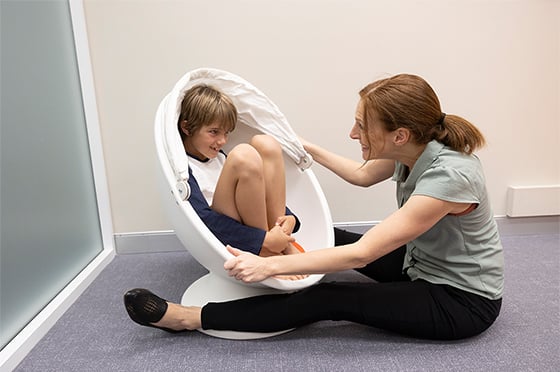
My child recently received an autism diagnosis. Should I talk to them about autism and neurodiversity?
What we know from research with autistic teens and adults is that disclosure is generally a positive experience. Teenagers whose autism diagnosis was voluntarily disclosed to them described autism and themselves more positively than adolescents who did not experience voluntary disclosure (Kapp et al.,2020). Research has shown parents perceive openness with their autistic child’s diagnosis to be enlightening and potentially empowering (Riccio et al., 2020). Though some non-autistic parents were concerned that disclosure may be detrimental for their child prior to sharing (i.e. making their child more anxious), autistic parents did not share these same concerns (Crane et al., 2021). A randomised control trial used a program focusing on educating children on the strengths and needs associated with autism, and found that following the program, children had a greater awareness of their unique learning profile and there was no impact on self-esteem (Gordon et al., 2015).
It is natural for humans to seek to understand themselves, and it can also be very valuable for a child to learn about their autism and connect with the autistic community. So, the answer is yes, talk about it.
OK – but how and when?
We know that every child and family experiences an autism diagnosis process in different ways. It is common for families to feel uncertain about how they want to share information about a diagnosis and for feelings to change over time.
There isn’t a one size fits all approach. Any approach should be tailored to your child and circumstances. There are some themes that have emerged in the research that you may want to consider:
Start early - Discussing an autism diagnosis early allows information to be layered over time, in a way that makes sense to your child. Sometimes a starting point can be talking about similarities and differences that are concrete (e.g. hair colour) and then moving to more abstract concepts including different likes, learning styles and brain wiring. Starting discussions early fosters a sense of self and identity. We know that children who learned they were autistic at a younger age tend to feel happier about their lives than those who find out later in life (Oredipe etal., 2023).
Multiple times and multiple sources - Information should be shared by multiple people and through multiple sources (to reduce biases from one individual doing all the explaining). Autistic parents tend to feel more confident than non-autistic parents in having diagnosis discussions independently and are more likely to draw upon their personal experiences of autism, though sometimes seeking support from a professional can be beneficial (Crane et all., 2021). There are lots of great books and videos out there to support you in different ways but watch them first to ensure they are neuroaffirming, acknowledging autism as a brain difference rather than deficit.
Be real - Being neuroaffirming isn’t only talking about the ‘positives’ but the true authentic experience and reality. It’s important to acknowledge and affirm challenges while leveraging the strengths. Being positive about the diagnosis is important, however, challenges should not be glossed over either.
Link in with the autistic community - Finding an autistic mentor can be a way for a child to have access to a positive autistic identity and culture. An autistic peer or mentor can also provide their unique perspectives of their own diagnosis.
Consider your own feelings – Do you feel well equipped to talk to your child about their diagnosis? How are you feeling? Is there more information to learn or people to learn from that could support you with this journey?
Whatever and however you choose to talk to your child about their autism diagnosis, it’s important to use words that help them understand who they are and support them to feel good about themselves.
References
Crane L, Lui LM, Davies J, Pellicano E. Autistic parents' views and experiences of talking about autism with their autistic children. Autism. 2021 May;25(4):1161-1167. doi: 10.1177/1362361320981317. Epub 2021 Jan 4. PMID: 33397133; PMCID: PMC8111227.
Riccio A, Kapp SK, Jordan A, Dorelien AM, Gillespie-Lynch K. How is autistic identity in adolescence influenced by parental disclosure decisions and perceptions of autism? Autism. 2021 Feb;25(2):374-388. doi: 10.1177/1362361320958214. Epub 2020 Sep 24. PMID: 32969254.
Gordon K, Murin M, Baykaner O, Roughan L, Livermore-Hardy V, Skuse D, Mandy W. A randomised controlled trial of PEGASUS, a psychoeducational programme for young people with high-functioning autism spectrum disorder. J Child Psychol Psychiatry. 2015 Apr;56(4):468-76. doi: 10.1111/jcpp.12304. Epub 2014 Aug 1. PMID: 25132516; PMCID: PMC4402033.
Oredipe T, Kofner B, Riccio A, Cage E, Vincent J, Kapp SK, Dwyer P, Gillespie-Lynch K. Does learning you are autistic at a younger age lead to better adult outcomes? A participatory exploration of the perspectives of autistic university students. Autism. 2023 Jan;27(1):200-212. doi: 10.1177/13623613221086700. Epub 2022 Apr 11. PMID: 35404160.
